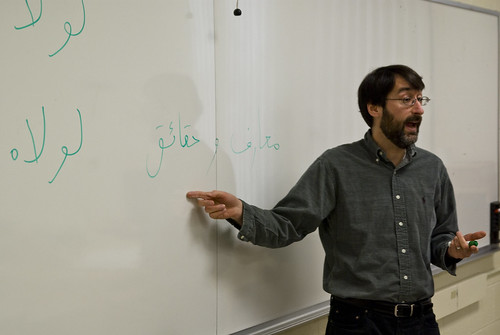
Senior David Kammiel, whose parents emigrated from Egypt in the 1970s, takes Arabic classes for cultural reasons.
For junior Ali Shater, learning the language quelled a curiosity he developed as a teenager.
Regardless of reasons, Kammiel, a political science and economics major, and Shater, a criminal justice major, are both part of a growing Arabic Certificate of Specialization program in Temple’s department of critical languages.
“The Arabic program keeps expanding,” said Gordon Witty, who is in his sixth year teaching Arabic. “It is expanding beyond the borders of Temple itself. More of our students are studying Arabic overseas at the undergraduate level.”
He said many Temple students travel to Jordan, Lebanon and Israel — among other Arabic-speaking countries — to study, and that others often receive prestigious scholarships to continue their studies of the language.
“In today’s world, the Arab culture is becoming woven into our culture very quickly,” said Shater, who is one of Witty’s students, adding that he hopes his certificate will help him to one day be fluent in the language. “To learn this language is to be able to communicate with other Arabic speakers in this country.”
Kammiel, another of Witty’s students, said while he decided to obtain the certificate because he already spoke colloquial Arabic at home and wanted to learn more, he hopes it will help him with a career in government.
“Most majors do not intermingle the way mine do, especially with the role the Middle East has had and will have in current and future political climates,” he said.
When Kammiel and Shater embarked on their paths toward Arabic specialization at Temple six semesters ago, they were members of a very small community of Arabic students on campus.
Department of critical languages chair Barbara Thornbury said enrollment in Arabic classes – and in courses of the other seven languages offered by the department – is growing quickly.
“We’re offering a robust program in Arabic language. We added a second full-time position this year,” she said. “But we’ve also added faculty in other languages in response to lots of interest at Temple and [to prepare students for] study abroad programs.”
In the Arabic department specifically, 116 students are enrolled in four different Arabic language and studies classes this semester, compared to only 75 students spread among three different classes last spring.
In Spring 2006, only 57 students were enrolled in classes.
Witty said a review of the names on class rosters from the year before he arrived at Temple shows that most students enrolled in the program then were of Arabic or Muslim descent.
He said despite the fact that more than 50 percent of students enrolled during the past several years come from Arabic or Muslim background, the number of students with no religious or cultural Arabic connections has grown most in the past few years.
Though Temple doesn’t yet offer a major or minor in the language, the growth in its program is on par with that reported by other schools offering programs like Dartmouth College in New Hampshire.
“We expect that our program will continue to grow for the foreseeable future and will continue to attract outstanding students from all over the country,” said Hussein Kadhim, a professor of Arabic at Dartmouth.
Kadhim said the school focuses on undergraduate education in the language and offers a minor and major, as well as a relatively large number of courses.
Emily Schultheis, a sophomore Arabic and Islamic studies minor at the University of Pennsylvania, said she thought Arabic would be a good addition to her dual English and communications major, helping her in the job market when she graduates.
“Arabic language programs are becoming more widespread,” she said, adding that she knows a fair number of students take classes in the language each semester at Penn. “But it’s still not the first language most people would think of taking.”
Witty said knowledge of Arabic will not only help students get jobs but will also make students more rounded in general.
“When you study the language, you learn about the culture, too, and I believe Americans really do need to better understand the Middle East,” he said. “Students who have studied only a semester or two of Arabic are not likely to remember much of it a few years down the line, but they will retain some of the cultural lessons and will have benefited from being exposed to another culture.”
He said in the long run, Temple has ambitions to add an Arabic minor and, hopefully, a major in the language.
“Most students are intimidated by Arabic because it gets a bad reputation as a difficult language,” Shater said. “But overall, it was and will be a very amazing language to learn and keep learning.”
Morgan Zalot can be reached at morgan.zalot@temple.edu.



Be the first to comment